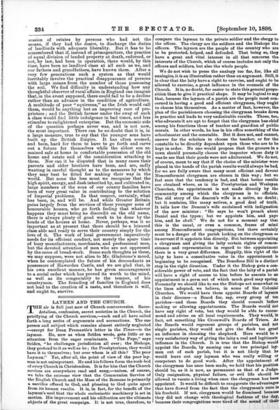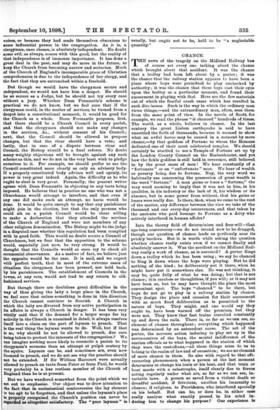LAYMEN AND THE CHURCH.
THE air is full just now of Church controversies. Sacer- dotalism, confession, secret societies in the Church, the petrifying of the Church services,—each and all have called forth a long series of arguments and accusations. The one person and subject which remains almost entirely neglected —except for Dean Fremantle's letter in the Times—is the layman. He, now as when Selden wrote, gets little or no attention from the eager combatants, "The Pope," says Belden, "he challenges jurisdiction all over; the Bishops, they pretend to it as well as he ; the Presbyterians, they would have it to themselves ; but over whom is all this ? The poor Layman." Yet, after all, the point of view of the poor lay- man is not unimportant. He and his fellows form the rock-bed of every Church in Christendom. It is for him that the Church services are everywhere read and sung,—unless, of course, we take the extreme view that the Communion Service of the English Church and the Mass of the Romans is primarily a sacrifice offered to God, and pleasing to God quite apart from its human results. It is, in fact, for the benefit of the layman's soul that the whole ecclesiastic machinery is set in motion. His improvement and his edification are the ultimate objects of the great campaign. It is not true, therefore, to compare the layman to the private soldier and the clergy to the officer. The clergy are the soldiers and the Bishops the officers. The laymen are the people of the country who are to be protected, helped, and defended. That being so, they have a great and vital interest in all that concerns the interests of the Church, which of course includes not only the officers and soldiers, but also the whole people.
We do not wish to press the analogy too far, for, like all analogies, it is an illustration rather than an argument. Still, it is clear that the laity have a right to exercise, and ought to be allowed to exercise, a great influence in the counsels of the Church. It is, no doubt, far easier to state this general propo- sition than to give it practical shape. It may be logical to say that, because the laymen of a parish are the people most con- cerned in having a good and efficient clergyman, they ought to choose him themselves. As a matter of fact, however, the plan of the parishioners choosing the clergyman breaks down in practice and leads to very undesirable results. Those, too, who advocate it are apt to forget that the clergyman has chief among his functions those of teacher and guardian of public morals. In other words, he has in his office something of the schoolmaster and the constable. But it does not, and cannot, answer for the scholars to choose the teacher, or for the constable to be directly dependent upon those who are to be kept in order. No one would propose that the grocers in a town should personally choose the inspector whose duty it was to see that their goods were not adulterated. We do not, of course, mean to say that if the choice of the minister were placed in the hands of the parish results would always be bad, for we are fully aware that many most efficient and devout Nonconformist clergymen are chosen in this way ; but we feel sure that the tendency is bad, and that better results are obtained where, as in the Presbyterian and Wesleyan Churches, the appointment is not made directly by the community among which the clergyman is to officiate. The old story of the deacon's wife is a satire, no doubt; but it contains, like many satires, a good deal of truth. It tells how the Deacon's wife exclaimed with indignation of the new minister : "He says he won't preach about Daniel and the types ; but we appoints him, and pays him, and he shall." We do not for a moment say that this is the usual, or even a common, frame of mind among Nonconformist congregations, but there certainly must be a danger of the parish looking on the clergyman as its servant if it appoints him directly. But between appointing a clergyman and giving the laity certain rights of remon- strance and representation in regard to the appointment there is a very great difference. Happily, this right of the laity to have a consultative voice in the appointment is beginning to be recognised. The Benefices Bill is a distinct step in the right direction. Under it the Bishop gets a con- siderable power of veto, and the fact that the laity of a parish will have a right of access to him before he assents to an appointment is a germ out of which much good may spring. Personally we should like to see the Bishops act somewhat on the lines adopted, we believe, in some of the Colonial Churches. We would have them appoint Boards of laymen in their dioceses—a Board for, say, every group of ten parishes—and these Boards they should consult before making or allowing appointments. The Boards would not have any right of veto, but they would be able to recom- mend and advise on all local requirements. They would, in fact, act something like Cromwell's Boards of Triers. AS the Boards would represent groups of parishes, and not single parishes, they would not give the flock too great an influence in choosing the shepherd. Here would be a very satisfactory way of giving the laity a real and legitimate influence in the Church. It is true that the Bishop would appoint the Boards, by naming one or two principal lay- men out of each parish, but it is not likely that he would leave out any layman who was really willing or competent to do good work. After the appointment of the clergyman has once been made, we hold that his position should be, as it is now, as permanent as that of a Judge. Only resignation, physical failure, or evil life should be allowed to vacate a living when once the clergyman has been appointed. It would be difficult to exaggerate the advantages that have flowed from the fact that the clergyman's cure is his freehold. If not, clergymen would be dismissed because they did not change with theological fashions of the day, because their congregations were tired of the sound of their
voices, or because they had made themselves obnoxious to some influential person in the congregation. As it is, a clergyman, once chosen, is absolutely independent. No doubt some evil, as always, comes with this good, but the reality of that independence is of immense importance. It has done a great deal in the past, and may do more in the future, to keep the Church from becoming narrow and sectarian. Much of the Church of England's incomparable grace of Christian comprehension is due to the independence of her clergy, and the fact that they are entrenched within a freehold.
But though we would have the clergyman secure and independent, we would not have him a despot. He should be as secure as a Judge, but he should not try every case without a jury. Whether Dean Fremantle's scheme is practical we do not know, but we feel sure that if the clergyman could, in the matter of services, be turned from a despot into a constitutional monarch, it would be good for the Church as a whole. Dean Fremantle proposes, first, that there should be a Church Council in every parish, and that the clergyman should not make any changes in the services, SLc., without consent of his Council ; next, that the Council should be allowed to propose changes, but that the vicar should have a veto; and lastly, that in case of a dispute between vicar and Council, the Bishop should be a final referee. No doubt many weighty objections will be brought against any such scheme as this, and we do not in the very least wish to pledge ourselves to it. For example, we should prefer to see the Council constituted more clearly as only an advisory body. If a properly constituted body advises well and openly, its power is very great indeed. Again, the difficulty as to who ought to elect is very great. Personally, the present writer agrees with Dean Fremantle in objecting to any tests being imposed. He believes that in practice no one who was not a Churchman would attempt to interfere, and that even if any one did make such an attempt, no harm would be done. It would be quite enough to say that any parishioner might join in the election, but that the only persons who could sit on a parish Council would be those willing to make a declaration that they attended the services of the Church of England and were not members of any other religions denomination. The Bishop might be the judge in a disputed case whether this regulation had been complied with in good faith. This would no doubt secure a Council of Churchmen, but we fear that the opposition to the scheme would, especially just now, be very strong. It would be thought that the Councils would at once try to check all ceremonial observances. As a matter of fact, we believe just the opposite would be the case. It is said, and we expect with perfect truth, that in most of the extreme cases of ritualism the clergyman has been pressed, not held back, by his parishioners. The establishment of Councils in the towns, at any rate, would not lead to any return to old- fashioned services.
But though there are doubtless great difficulties in the way of thus giving the laity a large place in the Church, we feel sure that unless something is done in this direction the Church cannot continue to flourish. A Church in which the laity are divorced from any active participation in its affairs is always a Church in danger. It has been very wittily said that if the demand for a larger scope for lay activity in the Church is examined in detail, it always resolves itself into a claim on the part of laymen to preach. That is the real thing the layman wants to do. Well, but if that is so, why should he not be allowed to preach, due care being taken to protect the interests of the congregation ? We can imagine nothing more likely to reconcile a parish to its clergyman's sermons than an attempt at pulpit oratory by the squire. Laymen can be, and sometimes are, even now licensed to preach, and we do not see why the practice should not be extended. If Sir William Harcourt were actually allowed to preach on texts from Peter or from Paul, he would very probably be a less restless member of the Church of England than he is at present.
But we have wandered somewhat from the point which we set out to emphasise. Our object was to draw attention to he fact that in ecclesiastical controversies the lay element is too apt to be forgotten, and that unless the layman's place is properly recognised the Church's position can never be regarded as altogether satisfactory. The "poor layman" is
usually, but ought not to be, held to be "a neglectable quantity."



































 Previous page
Previous page